The iPad Air Review
by Anand Lal Shimpi on October 29, 2013 9:00 PM ESTBattery Life
With the iPad Air Apple moved to a 32.4Wh battery, a significant decrease from the 42.5Wh unit in the 3rd and 4th generation iPads. The smaller battery doesn’t come with a change to Apple’s claim of 10 hours of battery life, which implies a reduction in overall platform power. I confirmed a substantial reduction in platform power in my crude measurements earlier in the article. Although it’s possible for the iPad Air to draw substantially more power than the iPad 4, our earlier power data seems to imply that it’s unlikely given the same exact workload. Our battery life tests agree.
We'll start with our 2013 smartphone/tablet web browsing battery life test. As always all displays are calibrated to 200 nits. The workload itself is hidden from OEMs to avoid any intentional gaming, but I've described it at a high level here.
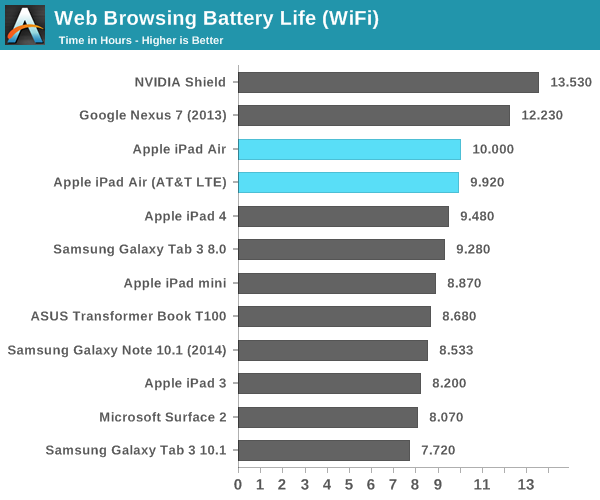
Our web browsing workload came in at exactly 10 hours of continuous usage - an improvement compared to the iPad 4. Battery life on LTE was good as well, consistently delivering just under 10 hours of usage. The fact that both LTE and WiFi tests deliver similar results tells me that we may be bottlenecked by some other component in the system (perhaps display?).
I've been running the same video playback test for a while now, although we're quickly approaching a point where I'll need to move to a higher bitrate 1080p test. Here I'm playing a 4Mbps H.264 High Profile 720p rip I made of the Harry Potter 8 Blu-ray. The full movie plays through and is looped until the battery dies. Once again, the displays are calibrated to 200 nits:
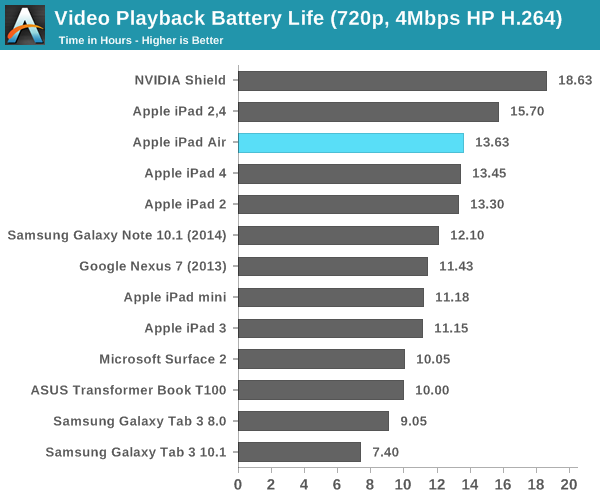
Video playback battery life also improves slightly compared to the iPad 4. Apple’s battery life claims aren’t usually based around video playback, so exceeding their 10 hour suggestion here shouldn’t come as a shock. Apple’s video decode power has always been extremely low.
Our final cross-platform battery life test is based on Kishonti's Egypt HD test. Here we have a loop of the Egypt HD benchmark, capped to 30 fps, running on all of the devices with their screens calibrated to 200 nits.
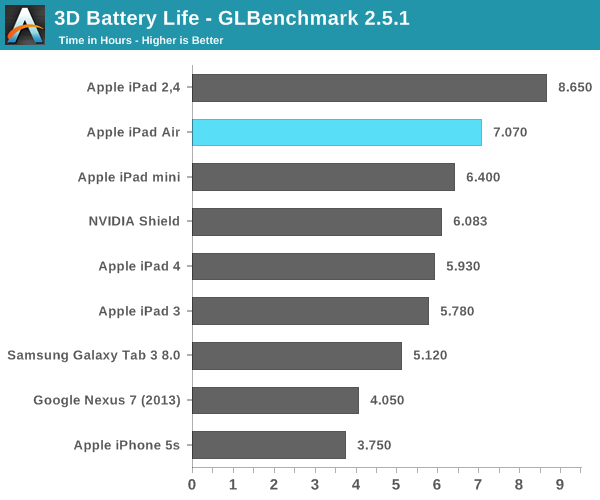
Our 3D battery life rundown test shows a substantial improvement in battery life over the iPad 4. IMG’s PowerVR G6430, running a moderate workload, can do so more efficiently than any of the previous generation GPUs in Apple’s SoCs. Much like the A7’s CPU cores however, there’s a wider dynamic range of power consumption with the G6430. Running at max performance I would expect to see greater GPU power consumption. The question then becomes what’s more likely? Since the majority of iOS games don’t target the A7 (and instead shoot for lower end hardware), I would expect you to see better battery life even while gaming on the iPad Air vs the iPad 3/4.
Charge Time
The iPad Air comes with the same 12W USB charger and Lightning cable that we first saw with the iPad 4. Having to only charge a 32.5W battery means that charge times are lower compared to the iPad 3 and 4:
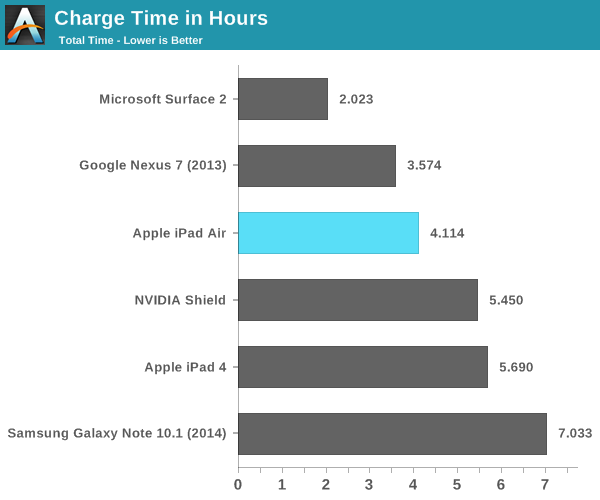
A full charge takes a little over 4 hours to complete. The adapter delivers as much as 12W to the iPad, drawing a maximum of 13.5W at the wall. I still think the sweet spot is somewhere closer to 2.5 hours but that’s another balancing game that must be played between charge time and maintaining battery health. It’s still so much better than the ~6 hours of charge time for the iPad 3 and 5.69 hours for the iPad 4.


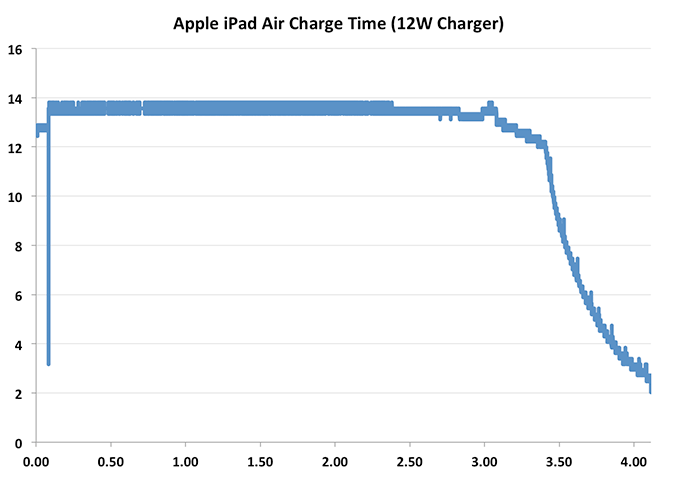








444 Comments
View All Comments
Wilco1 - Thursday, October 31, 2013 - link
Typically you run benchmarks at the maximum performance so you can compare different devices at known frequencies. A long running benchmark will always run at the maximum frequency - as long as there is no thermal throttling. So DVFS only has an effect on benchmarks which run for very short times (milliseconds like SunSpider, AnTuTu etc). This means the results are random based on the DVFS settings (hardware/software) and what you did just before starting the benchmark. That makes it hard to make fair comparisons. So setting the frequency before running a benchmark makes the results more useful.If you want to benchmark the DVFS then you need something more specific - I'm not aware of benchmarks which accurately try to measure DVFS, it's reaction speed, the power/performance tradeoff and effect on GUI interaction. The closest one is Anand's battery-life test which has idle periods followed by high activity bursts. Unfortunately he doesn't list performance of this test, only battery-life...
rynite - Friday, November 1, 2013 - link
"Typically you run benchmarks at the maximum performance so you can compare different devices at known frequencies."Oh please. Who decides how a benchmark is run? You? Or the actual benchmark authors like Anand and Futuremark, who publicly oppose this sort of behavior?
Wilco1 - Sunday, November 3, 2013 - link
Anand doesn't have a clue unfortunately. If INtel's turbo is not cheating then it is certainly not cheating to use the maximum frequency.Gondalf - Saturday, November 2, 2013 - link
Hei Wilco. IPC apart....without a SPEC submission it's hard to give a final judgment, what about A7 is only dualcore??? Anand says that A7 is the best around, but it's an absurdity !! In a multitasking workload A7 is clearly doomed by Snapdragon, Tegra, Baytrail. IMO this review is biased, A7 is good yes but only in light multithread, very bad in a serious usage, and looking at the selling price a customer is only a victim of Apple MarketingWilco1 - Sunday, November 3, 2013 - link
Yes, in terms of throughput A7 would be slower than most of the quad cores, however having the fastest single threaded performance is equally important.someonethinks - Wednesday, October 30, 2013 - link
iPad Air2 pleaseApple does it again, it will sell but device is not quite as good as it should be, do they care about the users or just the profit?
I would like
2GB and 32GB min
smooth transitions that can also be turned off / reduced
I have an iPad 2 and was looking to replace but the memory is really a big issue to future proof it, so I am VERY disappointed as I don't buy something like this every year.
With the original, I waited for the iPad 2 and was very pleased, it looks like I need to do the same again or maybe I now just go elsewhere.
xype - Wednesday, October 30, 2013 - link
Ooooor you could assume that the iPad Air is actually good enough. Because it is. Go and try it with some apps at a store and then decide; the whole making assumptions based on articles is not really helpful. Compared to an iPad 2, the iPad Air will absolutely blow you away.aliasfox - Wednesday, October 30, 2013 - link
Good enough? Yes. But for my money, "good enough" in 2013-2014 isn't enough - I want my devices to be "good enough" for a long time, especially at $500+. I kept my laptop for eight years, my previous digital camera lasted eight years, the shortest I've kept a cell phone is three and a half years, and my current desktop is seven years old with just a GPU and storage upograde (granted, that was a high end machine when it came out).Buying a device that has deficiencies *now* is questionable if you want to keep it for a while.
And don't think this is coming from a PC fanboy, either. iPad 1, iPhone 4, and Mac Pro are my primary devices.
KPOM - Wednesday, October 30, 2013 - link
By that logic, though, any Android device today has "questionable" specs since undoubtedly in a year or so most high-end Androids will have 64-bit processors. The iPad AIr, new iPad mini and iPhone 5s already have them.I think, also, that since all 3 have the same internals, we'll see developers write to those specs. I.e. lack of RAM won't be a significant issue because it isn't as if developers will be writing for devices with significantly more RAM.
suman0011 - Wednesday, October 30, 2013 - link
At every one knows apple has the leading market share in the android phones but now a days companies like Samsung are exploring the market at present Samsung has the major share in the android phone segment if i am right.in order to that apple has to found news to gain their place in the android marketas in most of the people use android phones that to Samsung phones
here you can find a link why Samsung why Samsung is in 1st place
http://indiahomedepot.com/samsung-galaxy-tab-t-211...
just look at only the specification and you can compare with apple ipad
of course all the features available in the apple also available in the Samsung can some tell why Samsung is first and Apple is trying hard to get first place?